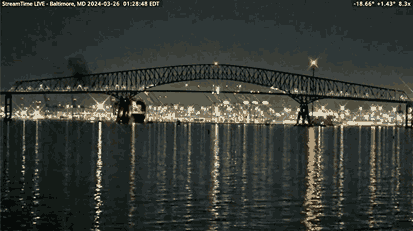
This morning I found myself listening to the radio news as I usually do – but there was something slightly unusual; I was being urged by the the host to look at the pictures of a bridge collapse in Baltimore. This was at around 7.30 in the UK, where I am, so only about 2 hours after a container ship crashed into the support tower of the 2-mile-long Francis Scott Key Bridge in Baltimore and destroyed it.
There was something unusual about hearing someone on the radio talking about a visual image with a hint of urgency. Sure, there are often discussions about movies with cast members, but it isn't often the medium risks implying the news is better seen rather than heard. This was different, so I grabbed my phone and, as instructed, watched. Only then – with a horrifying silent clarity – did I understand the scope of the event described.
The massive cantilever bridge collapse, now no doubt being repeated across news channels, was recorded by a fixed camera at 1:28:50 EDT which streams on YouTube through StreamTime LIVE. It was set up, apparently, as "a live stream of the shipping channel in Baltimore, Maryland, for people who enjoy watching ships."
The result is that my first news of this presumably deadly disaster – that's still unconfirmed as I type, though it's hard to imagine otherwise – was simply being encouraged to view it. I was left to form my own impression from the images on screen, though, of course, a newsroom was hastily getting engineers to comment and so forth. (Now, a little more time has passed, but it is still early in the day in Baltimore itself and a news conference is expected soon).
Nevertheless, that first impression – the one the world had for several hours, made me realise that our perception of events has changed so much as we, as a society, have become used to viewing events through camera lenses. Does it have a distancing effect? Or does it force us to think a bit more about what is happening – to be our own newsroom? I don't know.
If I had been stood where the StreamTime camera was this morning, I doubt I'd have been able to do much else but watch with horror. I'm not saying that as a society we're no longer looking out for each other. I simply remain struck by the fact that we're now so used to seeing things through screens that videos exist – and are shared around the world – before a message is attached. It feels a step further from the "Breaking News" intervention that shook the consciousness in 2001.
It's equally striking that there are so many cameras around that events like this can be recorded in such rich quality. Not long ago it'd have taken hours or days to collect some CCTV camera footage, but here there was a camera pointed directly at events and it was a matter of simply finding it and scrolling the timeline back in YouTube.
Is the world of the future always going to be documented like this? Is it just me who worries that it feels just a little hollow or is it OK that, as I watched, I realised how terrible this must be for those caught up in it and, only a few hours later, the news reporting seems to be catching up.
We keep a guide to the best camera for streaming.







